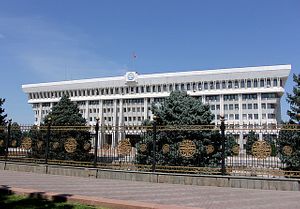It was a raucous weekend across the former Soviet Union as protesters took to the streets in Russia, Belarus, and Kyrgyzstan. To be clear: the protests in each country have their own context and causes, the scale and tone of both the protests themselves and the ensuing crackdowns also differ. That they all took place in states of the former Soviet Union is of note, but not necessarily probative.
Greater attention has been paid to the crackdowns in Russia and Belarus, but here at Crossroads Asia we’ll focus on the protests in Kyrgyzstan, which fit into a pattern that bodes ill in the country which has had two people-driven, protest-sparked revolutions in the past dozen years. President Almazbek Atambayev’s administration has been putting pressure on opposition politicians of late and the country is expected to hold a presidential election to pick his successor in November.
The spark for this weekend’s protesters was the return-from-exile and arrest of Sadyr Japarov. But the rabbit hole goes much further down — for Japarov and for the authorities in Bishkek.
Japarov, a former parliamentarian and member of the Ata-Jurt Party, had been living in Kazakhstan since 2013, evading arrest (we’ll get into the backstory in a moment). He was taken into custody at the Kyrgyz-Kazakh border and then to the State Committee for National Security, or GKNB, headquarters in Bishkek.
RFE/RL reports that about 500 people gathered near the GKNB building to protest Japarov’s arrest. A short AP report puts the number at 250 (and also says Japarov had been living in Cyprus, no mention of Kazakhstan). A few hours in, scuffles between protesters and police broke out. Ultimately, 64 protesters (some reports say 68) were arrested for up to 5 days and a dozen more were fined for hooliganism, destruction of property, and fighting with police.
EurasiaNet reported that according to Japarov’s lawyer, Sharadidin Toktosunov, the self-exiled politician returned voluntarily because he had been summoned as a witness — the lawyer said his detention and questioning was therefore illegal. He was arrested on charges relating to hostage-taking during protests in 2013; but first we have to go back to a previous protest in 2012.
In 2012, that old thorn in Kyrgyz politics — the Kumtor gold mine — was in vogue, with Japarov among those at the front of the pro-nationalization wave. In October 2012, Japarov — along with Ata-Jurt head Kamchibek Tashiev and Talant Mamytov — led protests in Bishkek calling for the ouster of then-Prime Minister Jantoro Satybaldiev a week after he refused to nationalize Kumtor.
The nationalist protest went awry when protesters tried to storm parliament. According to David Trilling’s March 2013 EurasiaNet report, during the October protest Tashiev vowed to “replace this government,” and “occupy” the White House. Then, “Tashiev led dozens of protestors over a fence surrounding the building and chased away armed guards. Tashiev later said he was just trying to get to work.”
The three politicians were arrested and charged with attempting to overthrow the government. When the trial ended in March 2013, Tashiev and Japarov were given year and a half sentences and generously credited with time they served while the trial went on and Mamytov was given a year and released shortly after the trial ended.
At the time, the commentariat and other politicians accused the Ata-Jurt politicians of deliberately trying to call attention to themselves — even politicians with comparably nationalistic views. A 2012 RFE/RL report notes that Mavlyan Askarbekov, the head of Erkin El, a youth nationalist movement, was skeptical about Japarov’s motives.
“We support the initiative to nationalize Kumtor, but we decided not to take part in the protest. It had a different goal. Sadyr Zhaparov organized the meeting in order to protect himself and score some political points,” Askarbekov said, alluding to the protests as a distraction from what the report called a “looming criminal case [against Japarov, presumably] on charges of looting during massive antigovernment protests in April 2010.”
(Incidentally, Askarbekov was on the losing end of a defamation suit in January and ordered to apologize for a Facebook post. He was also, apparently, arrested during a recent protest in Bishkek — not the Japarov protest this weekend, but a March 18 march for free speech.)
Japarov was released a few months later, but stripped of his parliament seat.
Later in 2013, protests in favor of nationalizing Kumtor turned violent in Karakol and Japarov was accused of bankrolling the protests and directing, remotely, the kidnapping of the regional governor, Emil Kaptagayev. Japarov fled the country in late 2013 and lived abroad, evading a second arrest — until now.
While Japarov’s lawyer has offered a reason for his return — apparently to be a witness — it seems an eminently unwise decision given the rate politicians have been arrested in Kyrgyzstan of late.
Meanwhile, yet another Ata-Meken parliamentarian, Almambet Shykmamatov, was charged Monday for fraud. His colleague Omurbek Tekebayev was detained in late February.
Correction: A previous version of this article stated that Mavlyan Askarbekov was arrested for his participation in the Ata-Meken protest. He was arrested for his participation in a separate free speech march. Additionally, Almambet Shykmamatov has not been arrested, only charged.
































